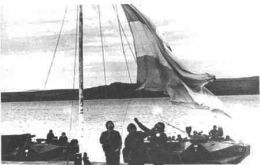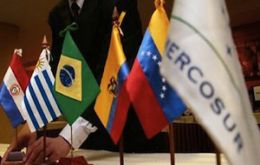MercoPress. South Atlantic News Agency
Argentina
-
Sunday, April 1st 2012 - 08:58 UTC
Thirty years after the Falklands short, victorious war

The Economist latest edition includes a piece on April 2nd 1982 when Argentina invaded the Falkland Islands. The ensuing war Britain fought to recover them still colors UK and Argentine domestic politics
-
Sunday, April 1st 2012 - 08:49 UTC
Argentina has decided to take control of YPF, says pro-government newspaper

The Argentine government has made the decision to take control of leading energy company YPF and is discussing whether to renationalize it or intervene in its administration, a newspaper reported on Saturday.
-
Sunday, April 1st 2012 - 08:37 UTC
Argentine government lavishly spending on self-promotion, says TI chapter

The Argentine government spent 1.225 billion Pesos (307.8 million dollars) in 2010 on public advertising campaigns, noting an increase of 25 times since 2003, according to a recent study (*) released by Poder Ciudadano, the Argentine national chapter of Transparency International.
-
Sunday, April 1st 2012 - 08:28 UTC
Rootyling for cash, the central bank has become Argentina’s Piggy bank

The Economist argues that with the latest legislation, the Argentine central bank has lost its legal independence and become the piggy bank of President Cristina Fernandez government.
-
Sunday, April 1st 2012 - 08:02 UTC
Argentina targets Mexican car imports and considers revoking trade agreement

Argentina is considering applying measures to restrict the import of Mexican cars, which could include unilaterally denouncing the Economic Complementation Agreement (ACE) 55, which regulates bilateral trade, Argentine government sources told local media, ámbito.com.
-
Sunday, April 1st 2012 - 07:54 UTC
Former president to stand trial in relation to Argentina’s deadliest terrorist attack

Former Argentine president Carlos Menem was ordered Friday to stand trial for obstruction of justice in a probe of the 1994 bombing of a building housing Jewish charity that killed 85 people.
-
Saturday, March 31st 2012 - 23:45 UTC
Cristina Fernández picks a fight

By Jimmy Burns - ‘La Presidenta’ relishes a battle – not least with the old enemy over the future of the Falklands. But is she losing her grip at home in Argentina?
-
Saturday, March 31st 2012 - 23:40 UTC
Height of Antarctica ice sheet increasing

According to findings come from the Europe’s Space Administration ESA’s ice-measuring satellite, CryoSat, over the last two years Antarctica’s ice sheet has increased in height.
-
Saturday, March 31st 2012 - 07:23 UTC
Argentine group questions ‘ambiguity’ of Malvinas April 2 commemoration

The same group of Argentine intellectuals and free thinkers that last February presented the document “Malvinas, an alternative view” in which among other things they recognize Falkland Islanders right to self determination, released a second text in which they strongly question having chosen April 2 to commemorate the Day of the veterans and the fallen in the Malvinas war.
-
Saturday, March 31st 2012 - 06:41 UTC
Argentina rejects WTO members’ criticisms; confirms ‘sovereign trade policies’

The Argentine government ratified its trade policies before the World Trade Organization, following the criticism of Argentine trade restrictions from twelve countries, including the US, EU and Japan, and assured it will continue to decide on its trade policies in a sovereign manner.
